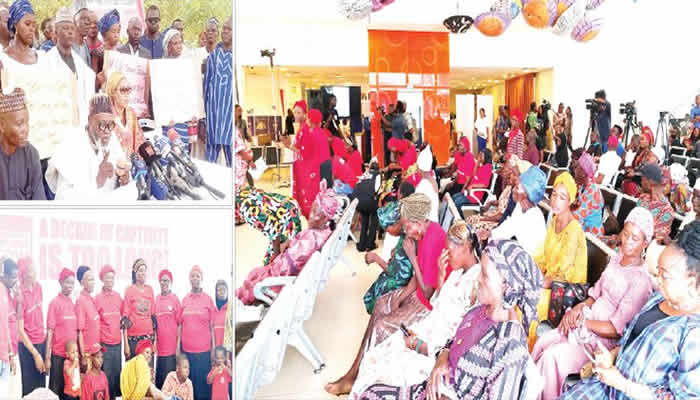The Kibaku Area Development Association has asked the Borno State Government to allow the Chibok schoolgirls so far rescued from Boko Haram to reunite with their families.
The community made the demand at a press conference held at the Unity Fountain in Abuja on Sunday in commemoration of the 10th anniversary of the abduction of the Chibok schoolgirls in April 2014.
On the night of April 14, 276 female students of the Government Girls Secondary School, Chibok, Borno State, aged 16 to 18 and mostly Christians, were kidnapped by the fundamentalist group, Boko Haram.
Before the raid, the school had been closed for four weeks due to deteriorating security conditions, but the girls were in school to take final exams in Physics.
A few hours before the raid, residents in Chibok reportedly received phone calls from neighbouring villages, warning of the incoming attack, as they sighted convoys containing armed insurgents driving in the direction of the town.
The terrorists reportedly broke into the school, dressed in military camouflage and pretended to be soldiers of the Nigerian Armed Forces.
The attack lasted for about five hours, during which houses in Chibok were also burnt.
The development generated both national and international outcry against the administration of former President Goodluck Jonathan, with an advocacy group, Bring Back Our Girls, formed to raise awareness and collaborate with the families and Chibok community to demand government action on the girls.
A decade later, the fate of 89 of the girls remains uncertain, while some of them have regained freedom.
Some of the schoolgirls had escaped immediately following the incident by jumping from the trucks in which they were being transported, and others were rescued by the Nigerian Armed Forces on various occasions.
According to the Kibaku Area Development Association, some of those rescued have been in the custody of the Borno State government and are yet to be reunited with their families.
Speaking during the Abuja press conference on Sunday, the National President of the Kibaku community (otherwise known as Chibok), Dauda Iliya, decried what he termed the second captivity of the released girls by the Borno State Government.
“We demand the urgent release of the rescued girls in the custody of the Borno State government to their families and not to anybody, nor the terrorists, the so-called repentant terrorists that were in the first place their abductors.
“The girls’ consent and that of their parents and guardians were not sought before they were abducted. As such, what is the basis to seek their consent before they are allowed to be returned to their parents? We demand that we are availed all the rescued daughters at home and in school, for any organisation or group that wants to support them.
There should be no restrictions. Borno State does not hold any monopoly over them. What we understand today is that these girls are held a second time in captivity, this time, by the government.” he said.
The association also challenged the government at all levels to bring an end to the fiasco by ensuring the rescue of the remaining girls.
Iliya further faulted the Borno State Government for the ‘obnoxious marriages’ between the returnee girls and ‘the so-called repentant terrorists,’ while also threatening legal actions against the state government for referencing marriages between the released girls and the terrorists.
“On this occasion of the 10th-year commemoration of the abduction of our daughters, we strongly challenge governments at all levels, federal, state and local, to work towards bringing closure, one way or the other, to this fiasco. To do nothing in the past decade is completely unacceptable.
“We demand a formal rebuttal and apology to all the families and the community at large, for the illegal cohabitation, encouraged by the Borno State Government, by calling the terrorists their husbands, and the failures to do so may result in legal action against the Borno State Government and all its officials, who have used this insulting and demeaning terminology to describe a very ugly and painful situation 10 years too long, too painful to bear,” he said.
When contacted on Sunday, the Borno State Commissioner of Information and Internal Security, Prof. Usman Tar, said he had spoken on the issue of Chibok girls on Saturday and was not disposed to speaking further.
In a press release on Saturday, the commissioner had said 187 of the abducted girls had been rescued and reunited with their families.
He said, “We also wish to use this occasion to take stock of the rescued girls and provide an update on how the girls are coming to terms with adjusting to normal life after captivity, and efforts of the Borno State Government to sustain the momentum on the rescue of the remaining girls.
“So far, out of the 276 abducted Chibok Girls,187 have been rescued and reunited with their families. Most of the rescued girls have, over the years, been enrolled in different schools or graduated under the supervision of the Federal Ministry of Women Affairs. A number of the girls have been enrolled into local and foreign scholarships or empowerment programmes. Many have since been reunited with their immediate families and are continuing to receive psychosocial support to reconcile them with normal life.
“Furthermore, 16 recently rescued girls are being rehabilitated by the Borno State Government and attending the 2nd Chance School where they learn skills in various vocations that will provide them with sustainable livelihoods, while their kids are also placed in nursery schools. Four rescued girls have voluntarily decided to return to their parents. We remain hopeful and determined that, with the combined efforts of our security forces, intelligence agencies, and community support, all abducted persons will be safely returned.”

